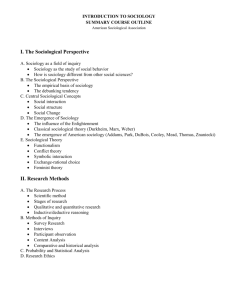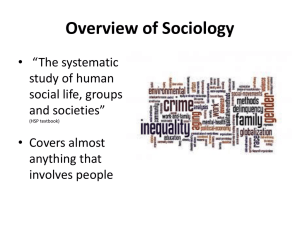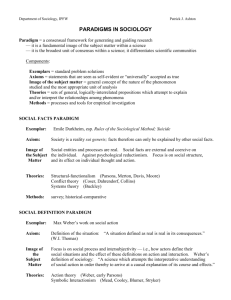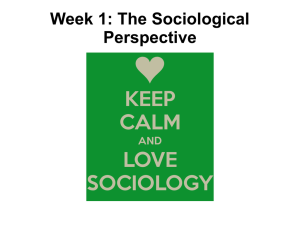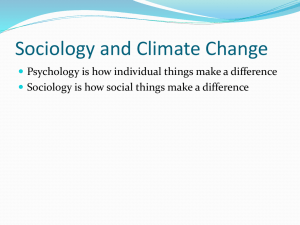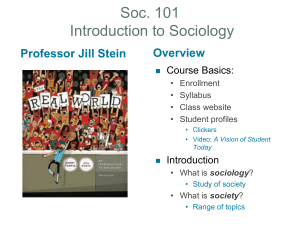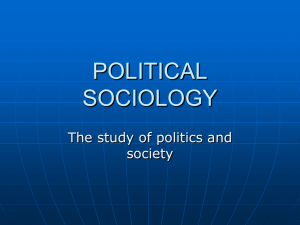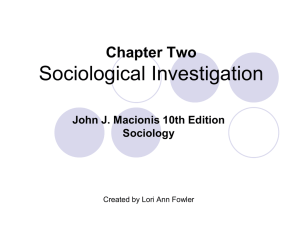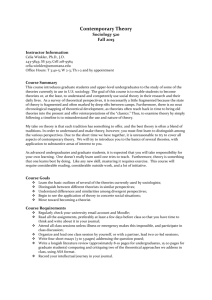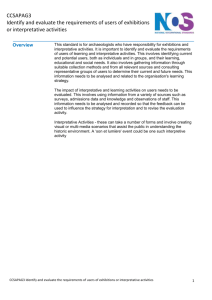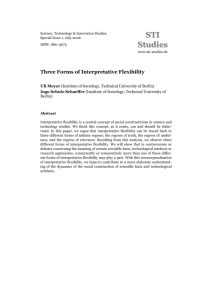Paradigms - Classifications - Perspectives - Theories
advertisement
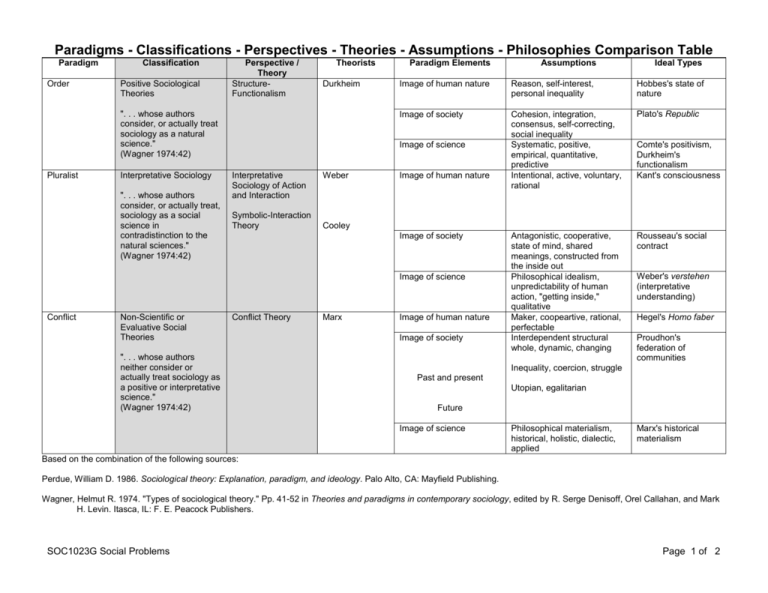
Paradigms - Classifications - Perspectives - Theories - Assumptions - Philosophies Comparison Table Paradigm Order Classification Positive Sociological Theories Perspective / Theory StructureFunctionalism Theorists Durkheim ". . . whose authors consider, or actually treat sociology as a natural science." (Wagner 1974:42) Pluralist Interpretative Sociology ". . . whose authors consider, or actually treat, sociology as a social science in contradistinction to the natural sciences." (Wagner 1974:42) Paradigm Elements Symbolic-Interaction Theory Weber Reason, self-interest, personal inequality Hobbes's state of nature Image of society Cohesion, integration, consensus, self-correcting, social inequality Systematic, positive, empirical, quantitative, predictive Intentional, active, voluntary, rational Plato's Republic Antagonistic, cooperative, state of mind, shared meanings, constructed from the inside out Philosophical idealism, unpredictability of human action, "getting inside," qualitative Maker, coopeartive, rational, perfectable Interdependent structural whole, dynamic, changing Rousseau's social contract Image of human nature Non-Scientific or Evaluative Social Theories Image of society Conflict Theory ". . . whose authors neither consider or actually treat sociology as a positive or interpretative science." (Wagner 1974:42) Comte's positivism, Durkheim's functionalism Kant's consciousness Cooley Image of science Conflict Ideal Types Image of human nature Image of science Interpretative Sociology of Action and Interaction Assumptions Marx Image of human nature Image of society Weber's verstehen (interpretative understanding) Hegel's Homo faber Proudhon's federation of communities Inequality, coercion, struggle Past and present Utopian, egalitarian Future Image of science Philosophical materialism, historical, holistic, dialectic, applied Marx's historical materialism Based on the combination of the following sources: Perdue, William D. 1986. Sociological theory: Explanation, paradigm, and ideology. Palo Alto, CA: Mayfield Publishing. Wagner, Helmut R. 1974. "Types of sociological theory." Pp. 41-52 in Theories and paradigms in contemporary sociology, edited by R. Serge Denisoff, Orel Callahan, and Mark H. Levin. Itasca, IL: F. E. Peacock Publishers. SOC1023G Social Problems Page 1 of 2 Paradigms - Classifications - Perspectives . . . Comparison Table (Continued) Paradigm . . . Order Positive Sociological Theories StructureFunctionalism Pluralist Interpretative Sociology Interpretative Sociology of Action and Interaction SymbolicInteraction Theory Conflict Non-Scientific or Evaluative Social Theories Society "Society is a set of interrelated parts; cultural consensus exists and leads to social order; natural state of society-balance and harmony." (1997:18) "Views society as a vast organism whose parts are interrelated; social problems are disruptions of this system. Also holds that problems of social institutions produce patterns of deviance or that institutions must address such patterns through strategic social change." (1998:8) "Society is a network of interlocking roles; social order is constructed through interaction as individuals, through shared meaning, make sense out of their social world." (1997:18) "Holds that definitions of deviance or social problems are subjective; separates deviant and nondeviant people not by what they do but by how society reacts to what they do." (1998:8) "Society is marked by power struggles over scarce resources; inequities result in conflict; social change is inevitable; natural state of society--imbalance." (1997:18) Conflict Theory "Views society as marked by conflicts due to inequalities of class, race, ethnicity, gender, age, and other divisions that produce conflicting values. Defines social problems as conditions that do not conform to society's values." (1998:8) Based on the combination of the following sources: Individuals "Individuals are socialized by society's institutions; socialization is the process by which social control is exerted; people need society and its institutions." (1997:18) Cause of Social Problems? "Rapid social change: social disorganization that disrupts the harmony and balance; inadequate socialization and/or weak institutions." (1997:18) "Humans are interpretative and interactive; they are constantly changing as their 'social beings' emerge and are molded by changing circumstances." (1997:18) "Different interpretations of roles; labeling of individuals, groups, or behaviors as deviant; definition of an objective condition as a social problem." (1997:18) "People are inherently good but are corrupted by society and its economic structure; institutions are controlled by groups with power; 'order' is part of the illusion." (1997:18) "Inequality; the dominance of groups of people over other groups of people; oppression and exploitation; competition between groups." (1997:18) "Social expectations fail, creating normlessness, cultural conflict, and breakdown. Social problems also result from the impersonal operations of existing institutions, both now and in the past." (1998:8) "Society becomes aware that certain behaviors exist and labels them as social problems." (1998:8) "Groups with different values and differing amounts of power meet and compete." (1998:8) Social Policy/Solutions "Repair weak institutions; assure proper socialization; cultivate a strong collective sense of right and wrong." (1997:18) "Engage in research and active intervention to improve social institutions." (1998:8) "Reduce impact of labeling and associated stigmatization; alter definitions of what is defined as a social problem." (1997:18) "Resocialize deviants by increasing their contacts with accepted patterns of behavior; make the social system less rigid. Change the definition of what is considered deviant." (1998:8) "Minimize competition; create an equitable system for the distribution of resources." (1997:18) "Build stronger social movements among groups with grievances. The conflicting groups may then engage in negotiations and reach mutual accommodations." (1998:8) Criticisms "Called 'sunshine sociology'; supports the maintenance of the status quo; needs to ask 'functional for whom?' Does not deal with issues of power and conflict; incorrectly assumes a consensus." (1997:18) "Concentrates on micro issues only; fails to link micro issues to macrolevel concerns; too psychological in its approach; assumes label amplifies problem." (1997:18) "Utopian model; Marxist states have failed; denies existence of cooperation and equitable exchange. Can't explain cohesion and harmony." (1997:18) Kornblum, William, Joseph Julian, and Carolyn D. Smith. 1998. Social problems. 9th ed. Englewood Cliffs, NJ: Prentice Hall. Mooney, Linda A., David Knox, and Caroline Schacht. 1997. Understanding social problems. New York: West Publishing. SOC1023G Social Problems Page 2 of 2


